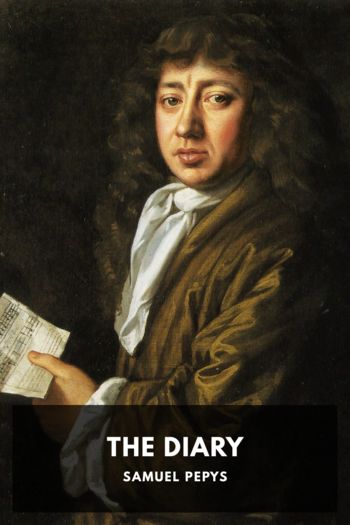The Diary - Samuel Pepys (red white and royal blue hardcover txt) 📗

- Author: Samuel Pepys
Book online «The Diary - Samuel Pepys (red white and royal blue hardcover txt) 📗». Author Samuel Pepys
↩
“A Copy of ye Duke of Albemarle’s Narrative brought in to ye House of Com̃ons by Sir Robert Brooks, Octob. 21, 1667,” commencing, “Being desired by the House of Com̃ons to impart what I have observed or knowne of any miscarriages in the late Warr, and particularly concerning the devision of the Fleet in the year 1666, I shall herein relate all I can during my being at sea, with respect to the shortnesse of the time and the want of many of my papers occasioned by the losse of Sir William Clarke, who attended me in the sea service and was slaine in it;” and “A Copy of Prince Rupert’s Narrative brought in to ye House of Com̃ons by the Lord Ancram, Octob. 31, 1667,” will be found in Harl. MS. 7170 (Brit. Mus.). The narratives are printed in Journals of the House of Commons, vol. ix, p. 11. ↩
See April 4th and October 20th, 1667. ↩
Pelham Humfrey, who had been educated under Captain Henry Cooke, was admitted a Gentleman of the Chapel Royal in 1666, and distinguished himself so much as to excite the envy of his instructor, who is said to have died of discontent at his pupil’s excelling him. Humfrey succeeded him as Master of the Children in 1672, but his career was very short; for he died at Windsor, July 14th, 1674, aged twenty-seven, and was buried in Westminster Abbey. He was sent abroad by Charles II in 1664, and received from secret service moneys £200 in 1664, £100 in 1665, and £150 in 1666, “to defray the charge of his journey into France and Italy.” In Paris he was instructed by Lully, whose methods he introduced into England. ↩
See note 3332. ↩
William Cartwright, actor, who became a bookseller in Turnstile Alley during the period of the Commonwealth. He was after the Restoration one of Killigrew’s company, at the original establishment in Drury Lane. He died in December, 1687, and by his will, dated 1686, he left his books, pictures, and furniture to Dulwich College, where also his portrait still remains. ↩
We have already seen that Pepys’s ancestors were seated at Cottenham, in Cambridgeshire, from which place a late Lord Chancellor of that name derived his title. —B. ↩
The Duke of Buckingham was his enemy, and there was a design to impeach the Duke of Ormond, but this was abandoned. There was great dissatisfaction in Ireland at his removal from the Lord Lieutenant-ship. ↩
The Fraternity of Woodmongers, or Fuellers, was incorporated by James I on the 29th August, 1605, and the Woodmongers’ Hall was situated in Duke’s Place, Aldgate. In 1665 the company surrendered its charter, but by an act of the Common Council in 1694 it obtained the privilege of keeping one hundred and twenty carts. It is now merged in the Company of Carters. The House of Commons was much occupied about this time with the misdoings of the Woodmongers. ↩
James Allestry, bookseller, who lost his property in the Great Fire. His son Jacob Allestry was a poetical writer. ↩
Lady Frances Cranfield, daughter of Lionel, first Earl of Middlesex, and wife of Richard Sackville, fifth Earl of Dorset. She was mother of the celebrated Lord Buckhurst. ↩
Evidently the song sung by Ferdinand, wherein Ariel echoes “Go thy way” (act iii, sc. 4), from Davenant’s and Dryden’s adaptation of the Tempest, published in 1674. The music was by Banister. —B. ↩
The “Heads of the Charges brought against Lord Clarendon in the House of Commons on the 26th day of October, 1667,” are printed in Journals of the House of Commons, vol. ix, p. 15, and in Lister’s Life of Clarendon, vol. iii, p. 530. ↩
Thomas King. ↩
Baptist May, born in 1629, and said to be the son of Sir Humphrey May, but this is doubtful. Keeper of the Privy Purse to Charles II, and Registrar in the Court of Chancery. He died May 2nd, 1698. ↩
Thomas Chicheley (1618–1694), Master-General of Ordnance, father of Captain Sir John Chicheley. He was knighted in 1670. ↩
Edward Backwell, goldsmith and alderman of the City of London. He was a man of considerable wealth during the Commonwealth. After the Restoration he negotiated Charles II’s principal money transactions. He was M.P. for Wendover in the parliament of 1679, and in the Oxford parliament of 1680. According to the writer of the life in the Dict. of Nat. Biog. his heirs did not ultimately suffer any pecuniary loss by the closure of the Exchequer. Mr. Hilton Price stated that Backwell removed to Holland in 1676, and died therein 1679; but this is disproved by the pedigree in Lipscomb’s Hist. of Bucks, where the date of his death is given as 1683, as well as by the fact that he sat for Wendover in 1679 and 1680, as stated above. ↩
Thomas Blagrave, Gentleman of the Chapel, Clerk of the Cheque, and one of Charles II’s private band. A few of his songs are printed in Select Ayres and Dialogues, folio, 1669. His portrait was in the Music School at Oxford. He died November 21st, 1688, and was buried in the north cloister of Westminster Abbey. ↩
“Warrant to pay to Lewis Grabu,





Comments (0)